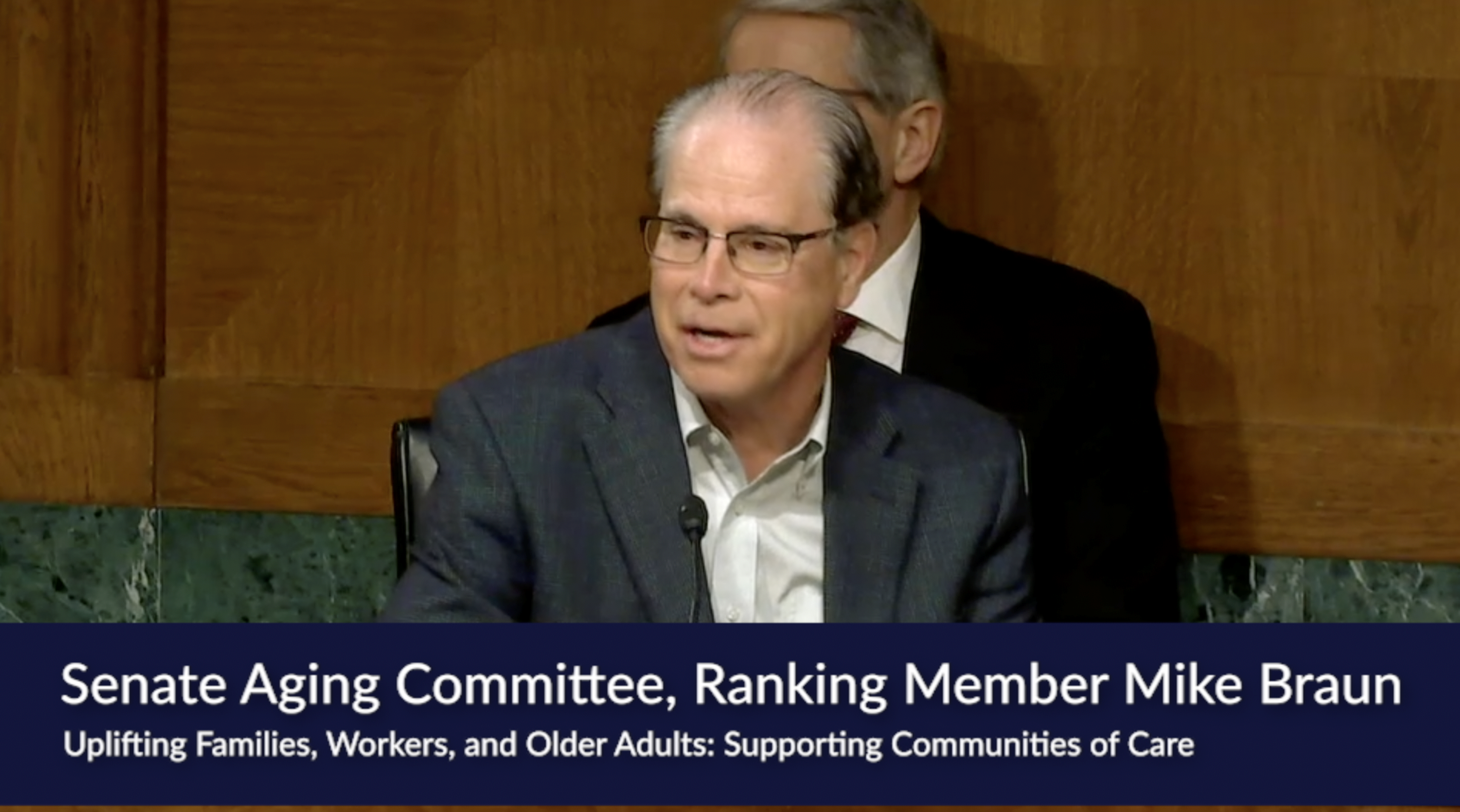Ranking Member Braun Opening Remarks Urging Support for Caregivers
WASHINGTON—Today, Sen. Mike Braun, Ranking Member of the U.S. Special Committee on Aging, delivered the following opening remarks at the committee’s hearing titled Uplifting Families, Workers, and Older Adults: Supporting Communities of Care.
Remarks as prepared:
Thank you, Chairman Casey and our witnesses here today.
I am grateful for the opportunity to serve as Ranking Member of the Aging Committee
My priorities will include health care, workforce, housing, and broadband.
I will seek to bring more transparency and accountability to make government work better for older Americans and future generations.
I am dedicated to protecting seniors from runaway inflation and restoring fiscal sanity so programs like Social Security and Medicare will be secure for older Americans.
REFORMING MEDICAID TO SUPPORT HOME AND COMMUNITY-BASED SERVICES
By 2030, 1 in 5 Americans is projected to be 65 years old or older which means a nearly 30% larger aging population in Indiana.
The majority of seniors want to stay in their home as they age.
Medicaid is adapting to support this goal. Nationally, the share of spending on Home and Community Based Services now accounts for about 60 percent of spending versus institutional care.
In Indiana, that proportion is only 35 percent, but the Hoosier state is embarking on a major reform of Medicaid Long-Term Services and Supports to help more seniors age at home.
As part of the new plan, the Hoosier state envisions that 75 percent of future Medicaid beneficiaries who need Long-Term Services and Supports will receive them at home.
ON SUPPORT FOR CAREGIVERS
Increasing home services will pose a big workforce challenge. By 2030, Indiana anticipates an estimated need of 14,000 more paid caregivers, a 20 percent increase from today.
One in five Americans are family caregivers.
They provide 37 billion hours of informal care each year for adult family members and friends with chronic illnesses. This is valued at $470 billion.
In Indiana, family caregivers get support from community organizations.
One example is the Cornerstone Lutheran Church in Carmel, Indiana.
Decades ago, members of this church recognized the need to support family caregivers, so they established what they called a Friendship Group.
Now Friendship Groups have grown across the state, helping family caregivers know where to turn for support.
Federal policies should support family caregivers.
The Administration’s proposed Independent Contractor Rule will hurt caregivers by restricting independent work and the flexibility it offers.
74% of independent workers say they prefer the arrangement because it gives them flexibility to be caregivers.
Women who make up the majority of caregivers will be disproportionately harmed by restricting independent contracting.
The independent contractor rule would force many of these women to choose between giving up work entirely or going back to full-time work and hiring paid caregivers.
ON WORKFORCE SOLUTIONS
Inflation is still high and widespread at 6.4%. This is driving up wages and making it harder for employers to recruit and retain new employees, including caregiving employers.
The Better Care Better Jobs Act would result in caregiving costs increasing over 15% for those who hire their own caregivers.
The federal government wants to rebalance spending on Long-Term Services and Supports from institutional care to Home and Community Based Services.
“Rebalancing” means shifting weight from one side to another. It does not mean adding more weight to a system that is already out of balance.
That is why I oppose the Better Care Better Jobs Act. Instead, Congress should support better training and credentialling for workers.
I reintroduced the bipartisan JOBS Act with Senator Kaine to expand Pell Grant eligibility to shorter-term job training programs.
For example, it will support training of Certified Nursing Aides.
I also reintroduced the Prioritizing Evidence for Workforce Development Act to fund education and workforce programs with proven outcomes.
This bill would help scale successful programs like the Goodwill Excel Center, which helps adults earn their high-school diplomas and provides training so they can enter high demand fields, like health care
Both these bills will help address the nationwide skills shortage and fill the over 11 million job openings in the United States.
I look forward to continuing to develop bipartisan solutions to this challenge.
Thank you, Chairman – I yield back.
###
